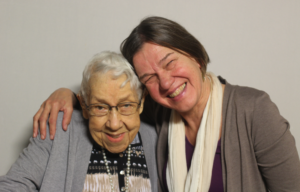How StoryCorps and The Greatest Generation Helps Us Get Better
November 27, 2019 • 4 Comments • Posted in careers/jobs for people who are blind, public speaking, radio, writing prompts
This photo was displayed on the big screen while Wanda’s StoryCorps conversation was playing, the two of us are always happy to be together, can you tell? Photo courtesy StoryCorps.
Couldn’t make it to the Chicago Cultural Center to hear writer Wanda Bridgeforth at StoryCorps Live: The Greatest Generation last Friday? Don’t despair! Now you can hear the five-minute excerpt they played online. One thing you’ll miss out on by listening at home is the positive energy in the room during Friday’s event. Ask anyone who was there (more people came than I’d anticipated!) and they’ll tell you. During the audience discussion afterwards a woman said, “It felt like a live history lesson!”
She was right.
As host, my job was to welcome the audience and introduce each of the six short excerpts selected from conversations with people over age 90recorded at the StoryBooth in the Chicago Cultural Center. Listening to their stories taught us a lot about Chicago history. You can link here to listen to all six stories, and among those five-minute excerpts of recorded conversations you’ll hear a Japanese-American man explaining to his son and granddaughter why his first job in Chicago, working graveyard shift at Oscar Mayer Meat Company, lasted only two months. . “One night an army colonel came walking through and spotted me. He told Oscar May’rs to ‘get rid of those Japs,’ so we were fired immediately.” In another conversation a woman tells her son about working in a laboratory at the University of Chicago in the 1940s and discovering later that her work was part of the Manhattan Project to develop an atomic bomb. “I didn’t know we were working on a bomb!” she tells him. “I had no idea.” Some people in the audience Friday gasped when they heard Wanda non-chalantly describe boundaries she grew up with on Chicago’s South Side. “We were blocked in,” she said. “We knew not to cross Cottage Grove, 51st Street or the train tracks. That was our neighborhood.” As a kid, if she crossed east on Cottage Grove Avenue a “policeman would come out of nowhere, ask where you were going and escort you right back across the street.”
Audience members stayed afterwards to enjoy a free lunch, talk with each other and meet the featured nonagenarians and their family members in person — Wanda’s daughter, Wanda, Jr., was there, too!
As I write this blog post, it occurs to me that maybe hearing StoryCorps Live helped people there feel less self-conscious? They sure sounded more open to conversation with others they didn’t know. The audience discussion afterwards was lively, it provided me with ideas for writing prompts for 2020 memoir-writing classes, no one hogged the microphone, we all seemed intent on, guess what? Listening.
I overheard dozens of conversations around me as my sister Cheryl and her daughter, my niece Janet, guided Seeing Eye dog Whitney and me out once the event was over. The two of them had surprised me by taking the train in from the suburbs to see Wanda (one of their favorites) and watch me host the event.
Janet is ten years younger than I am, she knows me well, and I have always been able to count on her to be painfully honest with me. “You were pretty nervous at first, I could tell,” she reported as we said our thanks and goodbyes to all the writers in my memoir classes who’d come from all over the city to be there. “But you got better,” she added.
Janet was right, of course. I did get better Friday, and I wasn’t alone: everyone there did! You can’t help but get better when listening to the Greatest Generation.
Many many thanks to Crystal Warren, Regional Director at Renaissance Court for letting StoryCorps Chicago know about the writers over age 90 in our memoir-writing class there, and to Amy Tardif, Regional Manager of the Chicago StoryBooth for listening! Bill Healy, the great guy who produces StoryCorps conversations for WBEZ was at Friday’s event and the StoryCorps staff members were a huge help in making it all go so smoothly: thank you Mary Bess Ser, Rocío Santos, Olivia Lindsley, Laura Saenz, and Juanpablo Ramirez. Link here to participate in the Great Thanksgiving Listen tomorrow and add your own story to the StoryCorps archive, too.
 selected highlights. Beth was able to listen to some morning testimony live, and she sort of helped me seek out things she thought were significant.
selected highlights. Beth was able to listen to some morning testimony live, and she sort of helped me seek out things she thought were significant.

